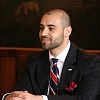How COVID-19 Overreaction Cast a Disturbing Communist Shadow Over Liberal Democracies Across the World
In
Log in if you are already registered
Coming from Poland equipped me with good understanding of communism, not only at the educational level, but also in personal capacity, as both parts of my diverse family have first-hand experience when it comes to the errors and horrors of communism.
Born to a Polish mother, whose family was subject to communist oppression and stigamitzation due to the non-proletarian status held within the society, and Tanzanian father, who was told in his former homeland, by my later mentor Lord Howe, how Africans should guard against communism and why they should prefer bwana ‘Kingy George’ over bwana ‘Joe Stalin,’ give me a unique mixture of insights and sparked deep historical curiosity.
During many family gatherings, religious holidays, or casual occasions - when all family members come together in order to cherish multigenerational presence and elders share some incredible, and sometimes terrifying, stories from their past, I have been constantly reminded that freedom cannot be taken for granted, and each generation has the responsibility to guard this precious gift given them by their forefathers.
Growing up in capitalist Poland, as well as later living, working and studying in one of the freest countries in the world, United Kingdom, opened further my eyes to the socio-economic advantages gained by the post-communist countries in our region after the collapse of the Soviet Union.
The very love for individual freedom, rule of law and unrestrained inquisitiveness, most recently resulted in pursuing further studies at London School of Economics and Political Studies, where I am concentrating on political sociology at the postgraduate level.
Being involved in researching modern factors shaping the current socio-economic world order, as well as taking variety of different modules dedicated to politics, history and economy of CEE region, deceived me to be thinking that the progress of our liberal democracies can easily continue uninterruptedly.
I know that it may sound a bit naive, but I have never thought that once underestimated message of newly discovered virus in Wuhan could ever made me rethinking lessons learned from my family experiences and cast doubt on whether our freedoms and achievements can withstand test of the current time.
When I was purchasing flight tickets to visit my relatives in Poland in the middle of March, I was not expecting what this decision will mean and what will come after entering the plane on Friday the 13th, commonly considered as unlucky day.
When I have arrived at Warsaw Modlin Airport, before passengers of my flight were allowed to leave the plane they were asked by two soldiers to fill out a document providing details of their stay, including address, contact number, email, purpose of arrival, as well as hosting person’s contact details, among other information, before their temperature was checked for coronavirus symptoms.
Although the flight staff and the mentioned army men were very professional and tried to, as it is very common for my countrymen and women, to deescalate an awkward situation with small-talk and jokes, I could definitely sense that most of the passengers were not feeling comfortable with these measures.
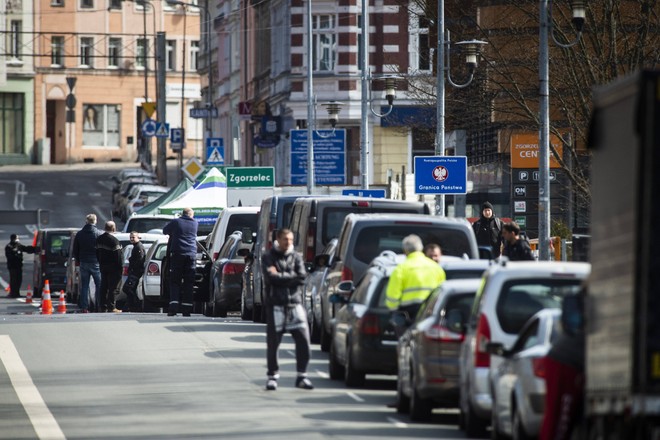
Source: Florian Gaertner/photothek.net v /Global Look Press
Happily for me, and others, no one was diagnosed with high temperature and all of us were allowed to leave the plane.
Welcomed by my friend at the airport, I could not forget about this uncomfortable feeling of anxiety on the plane when subconsciously I was afraid that somehow I will not be allowed to enter my home country, as perhaps, for some reason, my body temperature could not fit into allowed margin of error.
The rest of the day was pleasant and joyful, yet streets of Warsaw were empty like never before. My friend was even joking that she intentionally arranged this for my arrival.
After a short walk through the Castle Square, we went to a bookstore where I have picked up some books ordered online while I was still in London.
On our way back, I have decided to stop at the Pilsudski Square, which is named for Marshal Józef Piłsudski who was instrumental in the restoration of Polish statehood after World War I, and visit the Tomb of the Unknown Soldier. It was very calm and emotional experience, as there were only two soldiers protecting the Tomb, me, my friend, the waving Polish flag and the Cross, where in 1979 Pope John Paul II addressed a large gathering of our countrymen at an open-air Holy Mass during his first visit to Poland soon after his 1978 elevation to the papacy. After short, or perhaps a bit longer, moment of reflection, we have decided to go home.
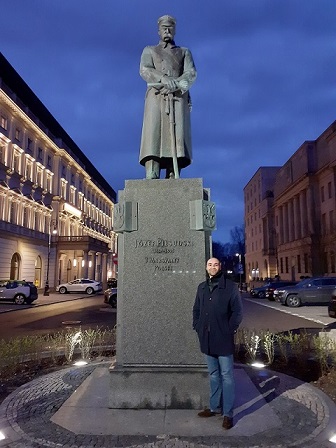
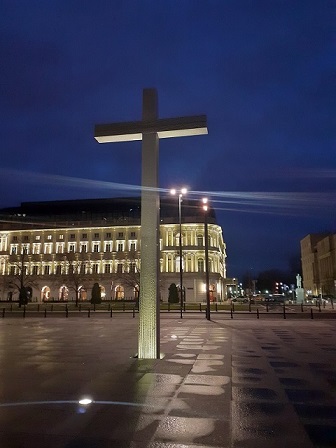
Next day, Saturday the 14th, there were rumours in the social media that Poland will close its boarders due to the coronavirus threat. The whole day was very strange. People were very frightened and I started receiving phone calls, and text messages, from many people, even those with whom I have not had contact for several years. On my email box, among notifications related to the update from London School of Economics that we are moving into an online learning mode by using ZOOM, I also found message that my flight was cancelled.
‘What is going to be?’ ‘How this is going to affect my life, friends and family?’ ‘What this coronavirus really is?’ And most importantly, ‘how this is going to affect the world that we know in the long run?’ These were the questions that I was repeatedly asking to myself in my head.
Coming messages from the Polish Health Ministry, as well as the British Government on my other number, received in the following days, were asking citizens to self-isolate themselves, not gathering in public spaces, leaving their houses only when it is necessary, not visiting elders (grandparents), making contactless payments rather than pay in cash, as well as many of my friends losing their jobs, made me feel very uncomfortable and sad.
With long queues in front of shops and growing meat panic, I also started to get worried. The entire situation became looking like in those stories told by my grandparents or read in history books, describing how life during communism looked like in Poland – and in broader sense, in our region. It is also worth noting, especially in regards to my current subject of study at LSE, that growing meat panic in Poland was first observed by sociologists in 1950-55. In subsequent years, the Poles faced the next meat crises, and one of the most important of them came in the 1980s. The communist Poland created the image of meat as a symbol of security.
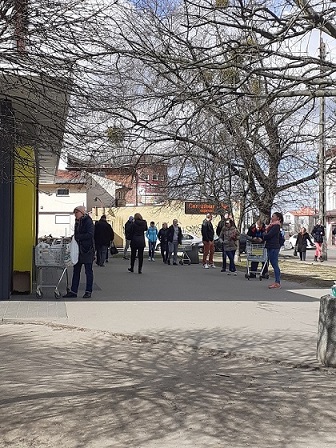
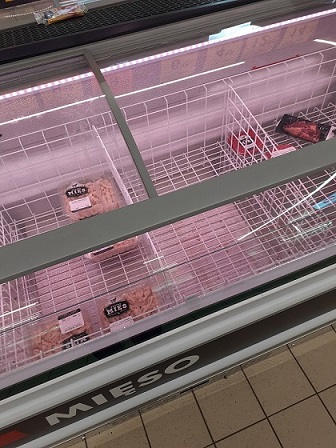
With growing fear and discontent, especially among young generation of Poles, heard in the shopping queues, television, and seen on the social media, I have started asking myself if the very same measures, which are bringing painful memories and tears to our grandparents eyes who are unable to see their family members, are the accurate response. Furthermore, does separating mothers from their newborn babies in hospitals is a humane practice, as even for me, not being a doctor, this does not make sense.
As a free and thinking person, believing in the very foundations of our democratic societies, and most importantly as a social scientist studying political sociology at one of the best universities in the world, I could not stay passive and take every message provided by our governments, and most disturbingly, by the China’s Communist Party, for granted.
Interestingly, I have managed to find many authoritative professional voices questioning the very measures taken by our political leaders towards COVID-19, and raising serious concerns over their impact on our societies and economy.
Not chronologically, yet still systematically, addressing the problem, I would first like to point out that several prime mainstream media outlets, including The New York Times, Washington Post, and Wall Street Journal, have so far published voices disagreeing with the current measures applied by the democratic governments around the world. To give an example, in a piece published on 20 March 2020 titled “Is our fight against coronavirus worse than the disease?”, Dr. David L. Katz writes the following: “I am deeply concerned that the social, economic and public health consequences of this near-total meltdown of normal life — schools and businesses closed, gatherings banned — will be long-lasting and calamitous, possibly graver than the direct toll of the virus itself. The stock market will bounce back in time, but many businesses never will. The unemployment, impoverishment and despair likely to result will be public health scourges of the first order.”
Secondly, it is significant to mention that many internationally acknowledged scientist voiced the same concerns in less publicly known capacity.
In an article published on 17 March 2020 titled “A fiasco in the making? As the coronavirus pandemic takes hold, we are making decisions without reliable data,” John P. A. Ioannidis, a Professor of Medicine, of Health Research and Policy and of Biomedical Data Science, at Stanford University School of Medicine and a Professor of Statistics at Stanford University School of Humanities and Sciences, as well as director of the Stanford Prevention Research Center, and co-director of the Meta-Research Innovation Center at Stanford (METRICS), argues that “at a time when everyone needs better information, from disease modelers and governments to people quarantined or just social distancing, we lack reliable evidence on how many people have been infected with SARS-CoV-2 or who continue to become infected. Better information is needed to guide decisions and actions of monumental significance and to monitor their impact.”
As for the data used by various governments, this eminent scientist says that it is “unreliable,” continuing that “most countries,” including the U.S., “lack the ability to test a large number of people and no countries have reliable data on the prevalence of the virus in a representative random sample of the general population.”
Relating to “reported case fatality rates” provided by the World Health Organization, he calls them “meaningless.”
What Professor Ioannidis observes is that “in the absence of data, prepare-for-the-worst reasoning leads to extreme measures of social distancing and lockdowns,” and adds that “school closures, for example, may reduce transmission rates. But they may also backfire if children socialize anyhow, if school closure leads children to spend more time with susceptible elderly family members, if children at home disrupt their parents ability to work, and more. School closures may also diminish the chances of developing herd immunity in an age group that is spared serious disease.”
What resonates in the Stanford’s academic assessment with most people’s concerns, especially among my family members, friends, and student community, is “that we don’t know how long social distancing measures and lockdowns can be maintained without major consequences to the economy, society, and mental health,” and this perhaps is the most paralyzing part of the current reality.
It is crucial to mention that not only scientists from the U.S. put into question rationality behind the “draconian” measures taken by our governments, previously only seen in the societies sick of communist disease.
In Germany, Frank Ulrich Montgomery, who is a German radiologist, former President of the German Medical Association and Deputy Chairman of the World Medical Association, said in an interview with General Anzeiger that he is “not a fan of lockdown.” He continued that “anyone who imposes something like this must also say when and how to pick it up again.”
Much more harsh rhetoric comes from Dr. Sucharit Bhakdi’s, former professor at the Johannes Gutenberg University in Mainz and head of the Institute for Medical Microbiology and Hygiene, as well as one of the most cited research scientists in German history, who argues that “[The government’s anti-COVID19 measures] are grotesque, absurd and very dangerous […] The horrifying impact on the world economy threatens the existence of countless people. The consequences on medical care are profound. Already services to patients in need are reduced, operations cancelled, practices empty, hospital personnel dwindling. All this will impact profoundly on our whole society.” He continues by adding that “all these measures are leading to self-destruction and collective suicide based on nothing but a spook.”
Several other German scientists voice the similar concerns, including Prof. Dr. Karin Mölling, Prof. Dr. Stefan Hockertz, and Dr. Wolfgang Wodarg, the latter being a physician specialising in Pulmonology, politician and former chairman of the Parliamentary Assembly of the Council of Europe.
What we can read on Dr. Wodarg’s website is that “the corona hype is not based on any extraordinary public health danger. However, it causes considerable damage to our freedom and personal rights through frivolous and unjustified quarantine measures and restrictions.”
According to the former EU executive, if we want to avoid mistakes in assessing the scale of the problem, we need to apply “solid epidemiological methodology” and ask the following questions, as for China and Italy infections: “Can anyone say how often such examinations were carried out in previous winters, by whom, for what reason and with which results?” Wodarg is interestingly adding, also from the point of view of a social science researcher like myself, that: “When someone claims that something is increasing, he must surely refer to something, that has been observed before.” He further describes his views on the ongoing ‘COVID-19 panic’ in more detailed manner in the following, multilingual, YouTube video.
Similarly sceptical voices also can be found in Israel, where Dr. Yoram Lass - an Israeli physician, politician and former Director General of the Health Ministry – calls the policy of “lockdown” a “lunacy” and argues that “whoever thinks that governments end viruses is wrong,” as well as in Poland, where Jerzy Milewski - doctor and member of the National Development Council of the President of the Republic of Poland – believes that “global quarantine is a historical example of decisions made almost without any data.”
As for the data argument, “SARS-CoV-2: fear versus data” academic article, published in International Journal of Antimicrobial Agents on 19 March 2020, may shed some light on the irrationality of the current measures: “The problem of SARS-CoV-2 is probably overestimated, as 2.6 million people die of respiratory infections each year compared with less than 4000 deaths for SARS-CoV-2 at the time of writing.”
By the finishing writing of this essay, I came across of yet another voice casting serious doubt on our response to this overblown problem, which comes from Dr. John Lee who wrote a piece in the latest issue of The Spectator’s magazine titled “How deadly is the coronavirus? It’s still far from clear,” where this “recently-retired Professor of Pathology and NHS consultant pathologist” argues the following: “There is a big difference between Covid-19 causing death, and Covid-19 being found in someone who died of other causes. Making Covid-19 notifiable might give the appearance of it causing increasing numbers of deaths, whether this is true or not. It might appear far more of a killer than flu, simply because of the way deaths are recorded.”
Dr. Lee also reminds us that “when drastic measures are introduced, they should be based on clear evidence. In the case of Covid-19, the evidence is not clear. The UK’s lockdown has been informed by modelling of what might happen. More needs to be known about these models. Do they correct for age, pre-existing conditions, changing virulence, the effects of death certification and other factors? Tweak any of these assumptions and the outcome (and predicted death toll) can change radically.”
Seeing how the communist government in China started responding to the outbreak by creating new regulations for disease control and applying draconic anti-pandemic strategies, censoring and manipulating online discourse on the topic, as well as coming up with the heroic narrative of the ‘People’s war’ on COVID-19, I dare to argue that leaders in the capitals of liberal democracies have taken a very worrying, and poisonous to the very fabric of our societies, example to be followed.
Sitting self-isolated in my apartment in Warsaw, and preparing for the summer term exams at the university, what resonates in my head is what Karl Marx wrote in his famous essay titled “The Eighteenth Brumaire of Louis Napoleon.” I am simply afraid that the current “farce” may turn into yet another “tragedy.”London-based political risk consultant and lawyer. Former chairman of the International Affairs Committee at Bow Group, postgraduate of London School of Economics and Political Science, RIAC expert
Blog: Adriel Kasonta's blog
Rating: 1

